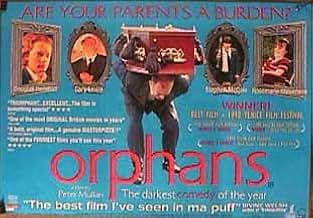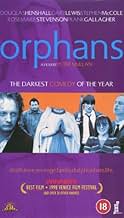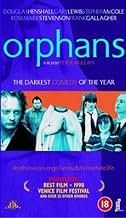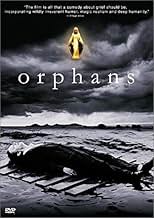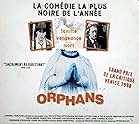IMDb RATING
7.0/10
1.9K
YOUR RATING
Four siblings gathered together for their mother's funeral in Glasgow face individual torments over night during a tumultuous storm that rips the roof off the church.Four siblings gathered together for their mother's funeral in Glasgow face individual torments over night during a tumultuous storm that rips the roof off the church.Four siblings gathered together for their mother's funeral in Glasgow face individual torments over night during a tumultuous storm that rips the roof off the church.
- Awards
- 10 wins & 2 nominations total
Linda Jane Devlin
- Evelyn (Waitress in Bar)
- (as Linda Cuthbert)
- Director
- Writer
- All cast & crew
- Production, box office & more at IMDbPro
Featured reviews
When I checked this film on IMDB, I was surprised. Not by the popular rating, 6.7 out 10 is a good mark but by the number of votes. Only, 368 votes! How can such a good movie by largely ignored by the public?
Peter Mullan in the world of British cinema is especially known as an actor. We remember his performance in the trendy "Trainspotting" (1996) where he acted the role of a heroin supplier. With "Orphans", he decided to display his gifts as a director. He chose wisely. His real debut movie is, by any standards a remarkable one. However I am obliged to recognize that for his first direction, the place of the action which the city of Glasgow in Scotland has nothing welcoming. Indeed, most of its inhabitants are narrow-minded or unpleasant. I read a few reviews about Mullan's film and all of them had said that Glasgow's inhabitants are really like this. If it is true, truth is stranger than fiction.
But also Mullan for his first directing chose a tough topic: what can be the childrens' reactions following the death of their mother? To answer this question, the filmmaker divided his movie in 4 individual parts. Each one focuses on one of the 4 main characters. Thus, we can say the following answer to the quoted question: either with violence (John, the college boy who tries to prove himself as a hard man) either with obstinacy (Thomas, the holier-than-thou chief mourner who wants everything to be perfect for their mother's funeral). As for the two others, Michael and Sheila, they feel especially lost. What Mullan tries to reveal to the spectator is that these reactions are necessary because this painful hardship represents for them the definitive transition in adulthood and maturity. The very last sequence shows the three brothers and the disabled sister together and they seem more united.
"Orphans" is a movie that swings between humor and poignancy, violence and calm with ease. Moreover, the moment when the roof of the church is torn off by the wind gives the film a little surrealist air. In short, it easily ranks among the best British movies of the nineties and it deserves to be better known. At last, given the success of "the Magdalene sisters" in 2003, Peter Mullan is well away to become one of the finest British directors of these last years.
Peter Mullan in the world of British cinema is especially known as an actor. We remember his performance in the trendy "Trainspotting" (1996) where he acted the role of a heroin supplier. With "Orphans", he decided to display his gifts as a director. He chose wisely. His real debut movie is, by any standards a remarkable one. However I am obliged to recognize that for his first direction, the place of the action which the city of Glasgow in Scotland has nothing welcoming. Indeed, most of its inhabitants are narrow-minded or unpleasant. I read a few reviews about Mullan's film and all of them had said that Glasgow's inhabitants are really like this. If it is true, truth is stranger than fiction.
But also Mullan for his first directing chose a tough topic: what can be the childrens' reactions following the death of their mother? To answer this question, the filmmaker divided his movie in 4 individual parts. Each one focuses on one of the 4 main characters. Thus, we can say the following answer to the quoted question: either with violence (John, the college boy who tries to prove himself as a hard man) either with obstinacy (Thomas, the holier-than-thou chief mourner who wants everything to be perfect for their mother's funeral). As for the two others, Michael and Sheila, they feel especially lost. What Mullan tries to reveal to the spectator is that these reactions are necessary because this painful hardship represents for them the definitive transition in adulthood and maturity. The very last sequence shows the three brothers and the disabled sister together and they seem more united.
"Orphans" is a movie that swings between humor and poignancy, violence and calm with ease. Moreover, the moment when the roof of the church is torn off by the wind gives the film a little surrealist air. In short, it easily ranks among the best British movies of the nineties and it deserves to be better known. At last, given the success of "the Magdalene sisters" in 2003, Peter Mullan is well away to become one of the finest British directors of these last years.
With his third film as director Neds seeing release just recently, the previous two films of Peter Mullan were given a back-to-back television showing. I managed to catch his first, Orphans, having never before heard anything of it.
Meeting to mourn the loss of their mother, four Glaswegian siblings gather in a pub. When an inconsiderate group laugh at the lugubrious singing of the eldest, one of his brothers retorts physically and is stabbed. The remaining brother vows to avenge this whilst the handicapped sister finds herself stuck in a darkened alley, her wheelchair broken.
Orphans begins with a solemn scene, the four siblings gathered around their mother's coffin. Some gentle humour is created through the siblings' confusion at their elder's request that they place some hair in the coffin. This introduces us to the film's primary structure: scenes of genuine heartfelt drama lined with a subtle comedy to balance the mood. As things progress, we begin to see in increase in this comic factor, the film's clever blending of its contrasting elements creating a wonderful dichotomy. The true beauty of the film, however, is in its juxtaposition of its constituent elements. Many are the scenes which Mullan allows to play out, drawing us in with a barrage of riotous laughter, before effortlessly turning this on its head with a disarming simplicity and forcing us to comprehend the dramatic implications of the events unfolding before us. In a simple moment, we go from laughing at something to considering its grim seriousness. It is a stunning effect, one often attempted but rarely realised so fantastically as here. Mullan ends his scenes by inviting us to reconsider what we have just seen; we find ourselves looking at events with a melancholy when just moments ago they had us reduced to breathless laughter. He allows us to indulge ourselves in the fantastic comedy his writing engenders before showing us that these scenarios are in fact tremendously dark and dramatic. We may chuckle at Michael's determination to pass off his stab wound as an industrial accident, but we quickly reevaluate the true humour of this when we realise that he is slowly dying, his lightening pallor eventually quite frightening. This is just one example of the many such twists Mullan throws at us, showing himself to be as dramatically dark as he is ingeniously funny.
A truly fantastic combination of drama and comedy, done in a subversive way which forces us to reevaluate what we thought of a scene just seconds before, Orphans is a fantastic exploration of the closeness of drama and comedy. Splendidly supported by fantastic, hilarious, and realistically authentic Glaswegian performances, this film has certainly proclaimed Peter Mullan as a masterful director.
Meeting to mourn the loss of their mother, four Glaswegian siblings gather in a pub. When an inconsiderate group laugh at the lugubrious singing of the eldest, one of his brothers retorts physically and is stabbed. The remaining brother vows to avenge this whilst the handicapped sister finds herself stuck in a darkened alley, her wheelchair broken.
Orphans begins with a solemn scene, the four siblings gathered around their mother's coffin. Some gentle humour is created through the siblings' confusion at their elder's request that they place some hair in the coffin. This introduces us to the film's primary structure: scenes of genuine heartfelt drama lined with a subtle comedy to balance the mood. As things progress, we begin to see in increase in this comic factor, the film's clever blending of its contrasting elements creating a wonderful dichotomy. The true beauty of the film, however, is in its juxtaposition of its constituent elements. Many are the scenes which Mullan allows to play out, drawing us in with a barrage of riotous laughter, before effortlessly turning this on its head with a disarming simplicity and forcing us to comprehend the dramatic implications of the events unfolding before us. In a simple moment, we go from laughing at something to considering its grim seriousness. It is a stunning effect, one often attempted but rarely realised so fantastically as here. Mullan ends his scenes by inviting us to reconsider what we have just seen; we find ourselves looking at events with a melancholy when just moments ago they had us reduced to breathless laughter. He allows us to indulge ourselves in the fantastic comedy his writing engenders before showing us that these scenarios are in fact tremendously dark and dramatic. We may chuckle at Michael's determination to pass off his stab wound as an industrial accident, but we quickly reevaluate the true humour of this when we realise that he is slowly dying, his lightening pallor eventually quite frightening. This is just one example of the many such twists Mullan throws at us, showing himself to be as dramatically dark as he is ingeniously funny.
A truly fantastic combination of drama and comedy, done in a subversive way which forces us to reevaluate what we thought of a scene just seconds before, Orphans is a fantastic exploration of the closeness of drama and comedy. Splendidly supported by fantastic, hilarious, and realistically authentic Glaswegian performances, this film has certainly proclaimed Peter Mullan as a masterful director.
What starts out as simple film about four siblings trying to cope with their mother's death, soon becomes a surreal tour-de-force. Peter Mullen pulls off a very tricky script and several changes of mood in the film to create something quite unique. There are some marvellous set pieces in here. It's a brave choice to use black comedy to highlight the pain of bereavement, but Orphans triumphantly pulls it off.
It's just a shame the film company buried the film, as this is one of the great British movies of the last few decades.
It's just a shame the film company buried the film, as this is one of the great British movies of the last few decades.
A magnificent film that deals with grief in a very black yet warm manner.
Three brothers and a sister are torn apart upon the death of their mother. In the lead up to her funeral they all express their loss in different ways, from the recklessly violent to the automated responses of dealing with the ritual of the funeral itself.
Peppered with wonderful moments of Glaswegian humour - the graveside scene, though obviously contrived, is a moment of pure comic genius - this film is both deeply touching and funny.
If you like your humour dark, see it now.
Three brothers and a sister are torn apart upon the death of their mother. In the lead up to her funeral they all express their loss in different ways, from the recklessly violent to the automated responses of dealing with the ritual of the funeral itself.
Peppered with wonderful moments of Glaswegian humour - the graveside scene, though obviously contrived, is a moment of pure comic genius - this film is both deeply touching and funny.
If you like your humour dark, see it now.
orphans is truly one of the best films i have seen in a long time. written and directed by peter mullan (who is already an amazing actor--miss julie, my name is joe), orphans takes us through the lives of four siblings who have to cope with the death of their mother. gary lewis (billy elliot) is the eldest, but most childish, son who cannot let go of mummy; stephen mccole (rushmore) is the juvenile delinquent of the family; rosemarie stevenson is their wheelchair-bound sister; and douglas henshall (twice upon a yesterday) is the adult of the lot who has to keep the family together. we see how each of the siblings deals with her death--whether it's by singing a song in a kareoke bar or getting into a brawl with another person, the siblings act on their emotions and often get into trouble.
the movie was a good mix of comedy (watch for the priceless scene with stephen mccole spying on a neighbour), drama, and action. douglas henshall was amazing, as he has to deal with his siblings as well as his own ex-wife and son while he is coping with mum's death. his character is so real and believeable. there are also many sweet scenes in the film, such as the scene in the beginning where they all remember being comforted by their mum during a storm. this movie kept me interested with its great script and acting, and everyone in it was excellent. stephen mccole especially did a great job--before orphans i knew his as just the mean scottish kid in rushmore. he represented the frustration of youth and also offered a lot of comic relief to the plot too. this is not your typical film, and i think it follows in the tradition of good scottish filmmaking. definitely check out orphans if you are looking for a dark comedy that is well-written with a cast of very talented actors. and it does come with subtitles, if you aren't good with scottish accents.
the movie was a good mix of comedy (watch for the priceless scene with stephen mccole spying on a neighbour), drama, and action. douglas henshall was amazing, as he has to deal with his siblings as well as his own ex-wife and son while he is coping with mum's death. his character is so real and believeable. there are also many sweet scenes in the film, such as the scene in the beginning where they all remember being comforted by their mum during a storm. this movie kept me interested with its great script and acting, and everyone in it was excellent. stephen mccole especially did a great job--before orphans i knew his as just the mean scottish kid in rushmore. he represented the frustration of youth and also offered a lot of comic relief to the plot too. this is not your typical film, and i think it follows in the tradition of good scottish filmmaking. definitely check out orphans if you are looking for a dark comedy that is well-written with a cast of very talented actors. and it does come with subtitles, if you aren't good with scottish accents.
Did you know
- TriviaPeter Mullan was horrified to learn that the film's production company, FilmFour, had accidentally burned over 30 minutes of footage. This was due to a clerical error.
- How long is Orphans?Powered by Alexa
Details
Box office
- Gross US & Canada
- $54,754
- Opening weekend US & Canada
- $16,098
- Mar 12, 2000
- Gross worldwide
- $54,754
- Runtime
- 1h 41m(101 min)
- Color
- Sound mix
- Aspect ratio
- 1.85 : 1
Contribute to this page
Suggest an edit or add missing content


